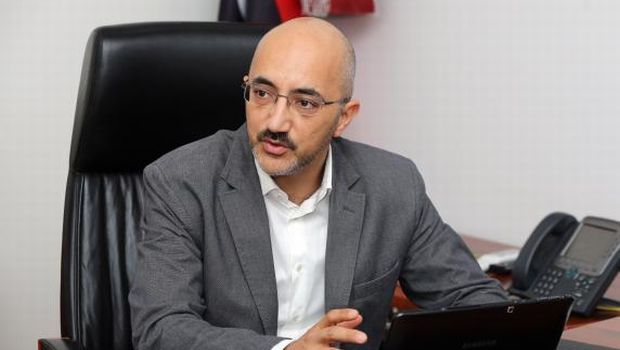
File photo—Libyan Communications and Information Minister Ossama Siyala gives an interview to Agence France-Presse at his office on September 14, 2013 in the Libyan capital Tripoli. Libya is going to launch a tender in 2014 for the award of the first private mobile phone license. (AFP PHOTO/MAHMUD TURKIA)
Expanding abroad would appear to mark a reversal of Zain’s strategy after it sold most of its Africa assets to India’s Bharti Airtel for USD 9 billion in 2010, and attempted unsuccessfully to offload its stake in Saudi affiliate Zain Saudi in 2011.
It would also be a vote of confidence in the investment environment of North Africa, which has been damaged by political and economic instability since the Arab Spring uprisings of 2011.
Zain, which operates in eight mostly Middle Eastern countries that include Iraq, has a 15.5 percent stake in Moroccan mobile operator inwi but otherwise is not present in North Africa.
The Kuwaiti firm would like to increase its holding in inwi and also seek management control of other operators in Arabic-speaking North Africa as opportunities arise, Scott Gegenheimer said in an interview at the Reuters Middle East Investment Summit.
He described the region as a good fit for Zain’s existing portfolio in terms of branding and operational synergies.
“North Africa looks very interesting and there are always opportunities coming up. We are looking across the board, whether it is Tunisia, Algeria, Morocco—increasing our stake there would be interesting for us.”
Dubai Holding’s telecommunications unit expects to conclude a deal to sell its 35 percent stake in Tunisia’s state-owned Tunisie Telecom within the next few months, its chief executive said last week.
Meanwhile United Arab Emirates telecommunications giant Etisalat is in talks to buy Vivendi’s 53 percent stake in Moroccan firm Maroc Telecom, in a deal that could be worth some EUR 3.9 billion (USD 5.4 billion).
Gegenheimer, who became Zain’s chief executive last December, said his company could also consider entering Egypt because of its population size, although he noted competition was fierce among the country’s mobile operators.
Zain is watching Libya, where a tender to manage the monopoly telecommunications operator was put on hold in March. The government has also said it wants to award Libya’s first private mobile phone license next year.
“We think (Libya) is an untapped market that would fit our portfolio fairly well,” Gegenheimer said.
“We see it as an opportunity. We have to make sure that we minimize the risk…We wouldn’t blindly go into any operation,” he added. “We would be interested in pretty much anywhere in North Africa.”
Zain made a net profit of KWD 113 million (USD 401 million) in the first half of this year, on consolidated revenues of KWD 612 million. It says it has a customer base of 44.4 million.
While the company wants to buy into other mobile operators, Gegenheimer believes most consolidation in the sector will come from telecommunications groups acquiring adjacent businesses such as Internet service providers and data centers.
“The regulators are looking for more competition, not less competition. I think you will see more vertical integration than horizontal,” he said, adding that this also applied to Zain.
He also expects more collaboration among mobile phone operators in areas such as site and network-sharing—for example, joint use of communications towers—to reduce costs and limit environmental damage.
“We are looking at a few of our markets for site-sharing. I think you will see over the next 12-18 months some site-sharing deals in some of the markets that we are operating in,” he said without giving details.
Mobile phone operators will also need to look at partnership deals with so-called “over-the-top” (OTT) service providers such as Skype, which offer telecommunications services over the Internet cheaply or for free.
Blocking such services will fail because people will always find ways around restrictions, Gegenheimer said. The next phase will be for operators to bundle together data, voice and text services to help offset declining conventional revenue, he said.
Zain plans to move towards becoming an integrated service provider by expanding into building fiber networks and the provision of technology and communications services to corporations, as part of what Gegenheimer called a “significant shift” for the group.
“Today we are mainly a mobile operator and that will change over the next five years, which will make us a much different player in the market and also help us deal with the impact of the OTT players as well.”
Within Zain’s portfolio, Iraq and Saudi Arabia offer the most promising growth prospects, Gegenheimer said. The two countries combined accounted for half of Zain’s customer base at the end of June.
Iraq, which brought in 40 percent of revenue in the first half of the year, faces challenges because of political violence that has slowed down market growth, Gegenheimer said.
But he said was still optimistic about Iraq’s potential, especially once Zain acquired a 3G license that would allow it to roll out more data services. It is unclear when the long-delayed license sale process will start in Iraq but it should be “fairly soon”, he added.
